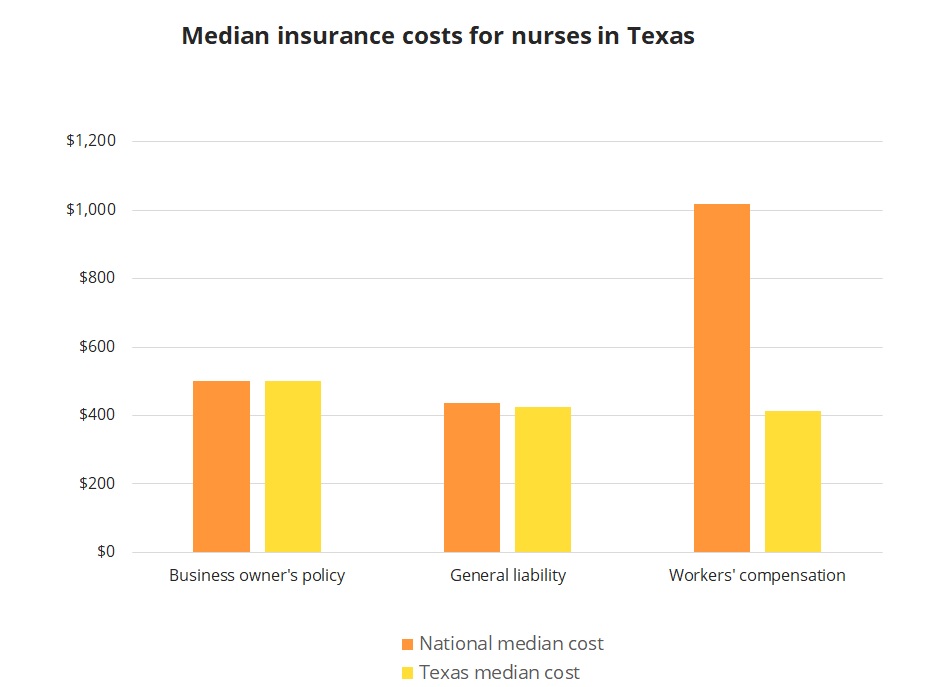
Nursing insurance in Texas
Learn about business insurance requirements and the most common policies for nurses in Texas.
Which policies are required for nurses in Texas?
Whether you're a registered nurse (RN), nurse practitioner (NP), or licensed practical nurse (LPN), contracts and state laws may require you to carry certain types of insurance.
If you have a commercial lease, your property manager may require you to purchase general liability insurance. Commonly purchased by nurses in Texas, general liability insurance can protect your business from expenses associated with common mishaps, such as client property damage and injuries.
Texas state law does not require employers to carry workers’ compensation coverage, though “non-subscribers” are required to report their status to the state workers’ comp agency.
Commercial vehicles and vehicles used primarily for work must be covered by commercial auto insurance. This policy helps cover legal costs and medical bills in the event of an auto accident.
Top nursing professionals we insure
Don't see your profession? Don't worry. We insure most businesses.
What are the most common insurance policies for nurses in Texas?
Nurses in Texas most often buy the following types of insurance. Which policies you need depends on the specifics of your business, such as the number of employees, ownership of a business vehicle, and the terms of any leases or contracts.
General liability insurance
General liability insurance is the foundation of a nurse’s business protection, with coverage that extends to client injuries, client property damage, and advertising injuries. Most commercial leases require you to have this coverage.
Business owner's policy
Nurses in Houston, Austin, Dallas, and elsewhere in the state sometimes qualify for a business owner’s policy (BOP). This package helps your business save money by bundling commercial property insurance with general liability coverage at an affordable rate.
Workers' compensation insurance
Texas state law does not require employers to carry workers’ compensation insurance, though “non-subscribers” are required to report their status to the state workers’ comp agency.
Though this coverage is optional, it's still recommended – even for sole proprietors and independent contractors. If you're injured on the job, your health insurance could deny the claim and leave you paying medical bills out of pocket.
Professional liability / medical malpractice insurance
Professional liability insurance protects against claims that your work caused harm. That could include accidentally administering the wrong medication, or a baseless claim that you mistreated a patient. This policy is sometimes referred to as medical malpractice insurance.
Commercial auto insurance
Business vehicles in Texas must carry enough commercial auto insurance to meet the state's minimum requirements for auto liability insurance.
This policy helps pay for medical bills, legal fees, and property damage when a business vehicle is involved in an accident.
Texas' auto insurance requirements are:
- $30,000 in bodily injury liability or death liability per person
- $60,000 in bodily injury liability or death liability to more than one person
- $25,000 in property damage per accident
Texas state law also requires personal injury protection (PIP) for any policies with liability coverage. However, you can sign a waiver to decline this coverage.
Cyber liability insurance
Nurses handle sensitive patient information on a daily basis, which is why cyber liability insurance is so important for this profession. This policy helps cover the costs of data breach notifications, fraud monitoring services, and other necessary responses to data breaches and cyberattacks.

How much does business insurance cost for nurses in Texas?
According to Insureon's customer data, nurses in Texas can expect to pay less than the national median for business insurance.
For example, the median annual cost of workers’ compensation for a nurse in the state is $414, less than half the national median of $1,019.

Save time and money with Insureon
Insureon’s industry-leading technology helps nurses in Texas save time and money shopping for insurance by comparing policies from top U.S. carriers. Start a free online application to review quotes for the policies that best fit your business. Our insurance agents are licensed in Texas and can answer your questions as you consider coverage.
To make the application go quicker, have this information ready:
- Workforce details, such as the number and types of employees
- Current and projected revenue
- Business partnerships
- Insurance history and prior claims
- Commercial lease insurance requirements
Apply for free insurance quotes for nurses today.
Verified business insurance reviews
Hear from customers like you who purchased small business insurance.








